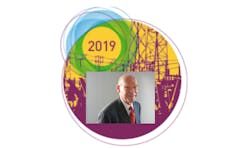2019 Circuit Breaker Seminar: Q&A With Jack Harley
Jack Harley is president of First Power Group LLC, which provides services to transmission substations of electric utilities and large industrial users of electric power. Harley is active in the IEEE Transformers Committee and IEEE Switchgear Committee and is a member of CIGRE.
During the 2019 Doble Circuit Breaker Seminar, from October 14-18 in Atlanta, Georgia, Harley will give an overview of lubrication of circuit breaker mechanisms. According to Harley, functional operation of many older circuit breakers may be affected by the condition and type of lubricants used in the mechanism and the method of lubricant application. Options for lubricant selection and factors to be considered for different components and environments will be presented. Selection and application factors are based on field observations, laboratory and simulator tests and best practices. Learn more by registering for the event and checking out the Q&A below.
Q: How does your current position help you in teaching courses or in presenting your course or session—and how does your past experience help you in this role?
A: I work with a team with very diversified engineering, materials and field operating skills. I am privileged to have had part of the team with me for more than 30 years. Before starting my own company, I worked with Ingersoll-Rand Company (I-R) applying and servicing equipment for electric utilities and other industries. All of this experience has provided an excellent background for establishing problem-solving credibility with utility industry leaders. I enjoy sharing our knowledge with others in the industry, including many who are just entering leadership positions with their companies.
Q: When and why did you decide to go into your particular career field?
A: My first venture, when I was in my early teens, was to collect old newspapers from residents of my town on Saturday mornings. I sold them to a nearby factory, which shredded and used them for packaging material for their glass thermometers. That eventually led me to want to start my own business. Later, when I was with I-R, I saw transformer-oil circulating pumps failing. I thought there must be a way to fix this problem. I left I-R and found the root cause of the issue, which led me to the central theme of my companies: designing and manufacturing products as well as performing services for the utility industry.
Q: What is the best thing about your job right now?
A: There is rapid change in the utility industry driven by cost, regulatory and demographic factors. This has created an opportunity for new tools that save wear and tear on equipment and the humans maintaining it. It is satisfying to know that we can materially impact both productivity and employee safety and wellness.
Q: What courses/sessions have you presented in the past, and what’s coming up (in addition to what you are featuring in this article)?
A: I have had the honor to speak about lubrication of circuit breaker mechanisms at the Circuit Breaker Seminar for a number of years. We are having discussions about expanding this to other audiences and to discuss further advances in lubrication of substation equipment. I would like participants to let me know if this is of interest.
Q: What’s the most important thing you’ve learned in your past experience that you want to communicate to students or participants?
A: There is an enduring spirit in the utility industry of searching for innovation, but it is important to balance this with caution. It is not enough to have a great idea. Products must be field proven before they gain widespread acceptance in a utility company. It is essential for manufacturers and service providers like us to be able to partner with a user for field trials that provide that proof.
Q: Why do you think your particular subject is important to the industry? How will it help your students?
A: Utilities today are facing considerable pressure to increase reliability in spite of aging systems as well as reducing costs to be competitive. The maintenance products and technologies we have developed help utilities to increase productivity and extend their equipment's effective life at a lower cost than traditionally expended. For example, we have invented the Lube-by-Number Kit that enables standardization of lubricants used during maintenance and gained knowledge of how to select greases for specific maintenance situations and how to lubricate many circuit breaker mechanisms without requiring extensive disassembly.
Q: What do you like to do in your spare time—do you see that as a complete escape or an extension of your career?
A: I read a lot of technical and business journals and business books. On other fronts, I publish a monthly free all-volunteer local newspaper and I am very involved in helping maintain the character of our community, which was a rather bawdy canal town in the past. Judy and I live in a wooded area of the Cuyahoga Valley National Park. I enjoy doing a number of outdoor activities including hiking, cutting wood and beekeeping.
Q: Anything else you would like to add about your teaching philosophy or that would add to your profile?
A: I like questions and comments from the audience while I am talking. This lets me know that I am connecting with the attendees. Ask them to hold the tomatoes, please!
Listen to his talk by registering for the event today.
